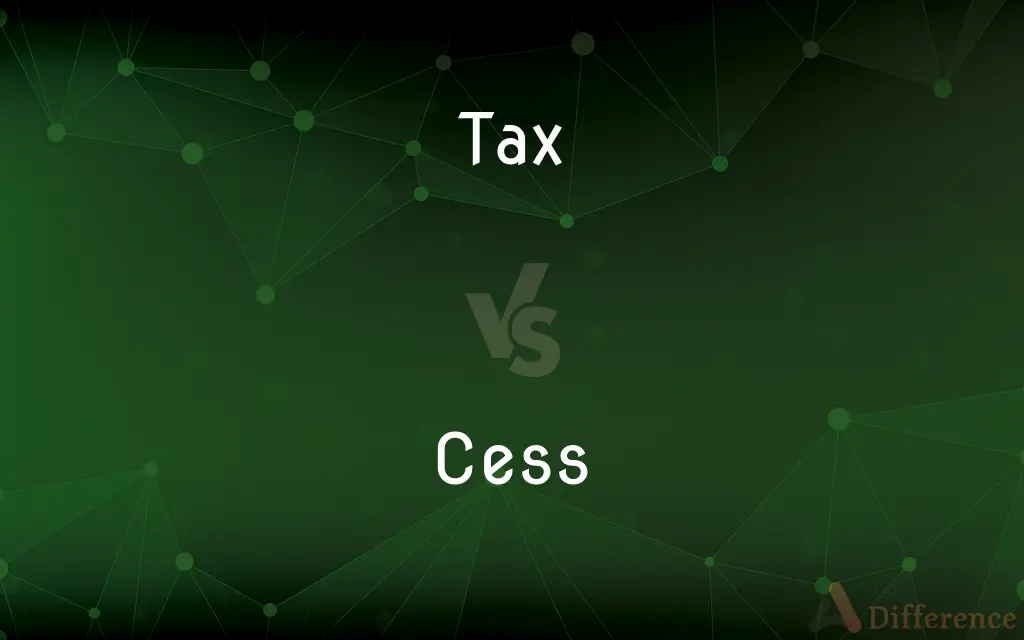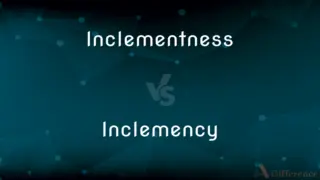Tax vs. Cess — What's the Difference?
By Tayyaba Rehman — Published on September 29, 2023
A tax is a compulsory financial charge imposed by a government on individuals or entities, while a cess is a specific tax levied for a particular purpose.

Difference Between Tax and Cess
Table of Contents
ADVERTISEMENT
Key Differences
Tax and cess are both financial charges that individuals or entities might be obligated to pay, typically to a government. A tax is a general term used to describe any compulsory charge or levy by a government on its citizens and businesses to fund public expenditures. It can be imposed on various bases, such as income, property, sales, and more. Cess, on the other hand, is a form of tax but is specifically collected for a defined purpose or a particular objective.
The concept of tax is broader and encompasses a variety of financial obligations, from income tax to sales tax. Governments use tax revenues to cover a wide range of public expenses, from infrastructure projects to social welfare programs. Cess is more specialized. For instance, a government might introduce a cess to fund relief efforts after a natural disaster or for educational development.
The obligation to pay tax is universal, meaning every eligible person or entity within a jurisdiction is expected to contribute. The rates and structures vary depending on the type of tax and the region. Cess, however, is typically introduced as an additional charge over and above the existing taxes. So, when a cess is levied, taxpayers often pay this in addition to the standard taxes they owe.
In essence, while all cesses are taxes, not all taxes are cesses. This distinction is crucial for taxpayers to understand their financial obligations and for where their money is channeled. Both tax and cess serve as tools for governments to gather revenues, but their purposes and implementations can differ significantly.
Comparison Chart
Nature
General compulsory financial charge.
Specific tax for a particular purpose.
ADVERTISEMENT
Purpose
Funds a variety of government expenditures.
Collected for a defined objective.
Obligation
Universal for eligible individuals/entities in a jurisdiction.
Additional charge over standard taxes.
Examples
Income tax, sales tax, property tax.
Education cess, infrastructure cess.
Implementation
Can be direct (income tax) or indirect (sales tax).
Typically imposed on top of existing taxes for a specific aim.
Compare with Definitions
Tax
Taxes can be direct or indirect.
While property tax is direct, a value-added tax (VAT) is indirect.
Cess
A cess is a tax levied for a specific purpose.
The government introduced an education cess to fund schools.
Tax
A tax is a compulsory financial charge or some other type of levy imposed on a taxpayer (an individual or legal entity) by a governmental organization in order to fund government spending and various public expenditures. A failure to pay, along with evasion of or resistance to taxation, is punishable by law.
Cess
Cess is typically over and above standard taxes.
Consumers pay both sales tax and a health cess on certain products.
Tax
A compulsory contribution to state revenue, levied by the government on workers' income and business profits, or added to the cost of some goods, services, and transactions
A tax bill
Higher taxes will dampen consumer spending
A tax on fuel
Tax cuts
They will have to pay tax on interest earned by savings
Cess
Cess rates are usually fixed and not ad valorem.
A $5 cess might be levied on each airline ticket, irrespective of its price.
Tax
A strain or heavy demand
A heavy tax on the reader's attention
Cess
Cesses aim at addressing particular societal or infrastructural needs.
A road cess might be imposed to maintain highways.
Tax
Impose a tax on (someone or something)
The income will be taxed at the top rate
Cess
Cess collection terminates when its objective is met.
Once the disaster relief fund was sufficient, the relief cess was discontinued.
Tax
Make heavy demands on (someone's powers or resources)
She knew that the ordeal to come must tax all her strength
Cess
Cess is a tax. It is usually known as tax on tax.
Tax
Confront (someone) with a fault or wrongdoing
Why are you taxing me with these preposterous allegations?
Cess
Luck.
Tax
Examine and assess (the costs of a case)
An officer taxing a bill of costs
Cess
An assessed tax, duty, or levy.
Tax
A contribution for the support of a government required of persons, groups, or businesses within the domain of that government.
Cess
Usually preceded by good or (more commonly) bad: luck or success.
Tax
A fee or dues levied on the members of an organization to meet its expenses.
Cess
(obsolete) Bound; measure.
Tax
A burdensome or excessive demand; a strain.
Cess
(rail transport) The area along either side of a railroad track which is kept at a lower level than the sleeper bottom, in order to provide drainage.
Tax
To place a tax on (income, property, or goods).
Cess
To levy a cess.
Tax
To exact a tax from
Taxed the people.
Cess
To cease; to neglect.
Tax
(Law) To assess (court costs, for example).
Cess
A rate or tax.
Tax
To make difficult or excessive demands upon
A boss who taxed everyone's patience.
Cess
Bound; measure.
The poor jade is wrung in the withers out of all cess.
Tax
To accuse; confront
Taxed him with ingratitude.
Cess
To rate; to tax; to assess.
Tax
To hold accountable
The contractor was taxed with the mistake of the subcontractor.
Cess
To cease; to neglect.
Tax
Money paid to the government other than for transaction-specific goods and services.
Tax
A burdensome demand.
A heavy tax on time or health
Tax
A task exacted from one who is under control; a contribution or service, the rendering of which is imposed upon a subject.
Tax
(obsolete) charge; censure
Tax
(transitive) To impose and collect a tax from (a person or company).
Some think to tax the wealthy is the fairest.
Tax
(transitive) To impose and collect a tax on (something).
Some think to tax wealth is destructive of a private sector.
Tax
(transitive) To make excessive demands on.
Do not tax my patience.
Tax
(transitive) To accuse.
Tax
(transitive) To examine accounts in order to allow or disallow items.
Tax
A charge, especially a pecuniary burden which is imposed by authority.
Tax
A charge or burden laid upon persons or property for the support of a government.
A farmer of taxes is, of all creditors, proverbially the most rapacious.
Tax
A task exacted from one who is under control; a contribution or service, the rendering of which is imposed upon a subject.
Tax
Especially, the sum laid upon specific things, as upon polls, lands, houses, income, etc.; as, a land tax; a window tax; a tax on carriages, and the like.
Tax
A disagreeable or burdensome duty or charge; as, a heavy tax on time or health.
Tax
A sum imposed or levied upon the members of a society to defray its expenses.
Tax
Charge; censure.
Tax
A lesson to be learned; a task.
Tax
To subject to the payment of a tax or taxes; to impose a tax upon; to lay a burden upon; especially, to exact money from for the support of government.
We are more heavily taxed by our idleness, pride, and folly than we are taxed by government.
Tax
To assess, fix, or determine judicially, the amount of; as, to tax the cost of an action in court.
Tax
To charge; to accuse; also, to censure; - often followed by with, rarely by of before an indirect object; as, to tax a man with pride.
I tax you, you elements, with unkindness.
Men's virtues I have commended as freely as I have taxed their crimes.
Fear not now that men should tax thine honor.
Tax
Charge against a citizen's person or property or activity for the support of government
Tax
Levy a tax on;
The State taxes alcohol heavily
Clothing is not taxed in our state
Tax
Set or determine the amount of (a payment such as a fine)
Tax
Use to the limit;
You are taxing my patience
Tax
Make a charge against or accuse;
They taxed him failure to appear in court
Tax
A tax is a compulsory financial obligation imposed by a government.
Everyone earning above a certain threshold must pay income tax.
Tax
Tax serves to fund public services and government functions.
Sales tax contributes to state revenue used for public projects.
Tax
Tax rates and structures vary across jurisdictions.
Corporate tax rates might differ significantly between countries.
Tax
Tax evasion is illegal and subject to penalties.
He faced heavy fines for not declaring all his income for tax purposes.
Common Curiosities
Can one be subject to both tax and cess?
Yes, cesses are typically levied in addition to standard taxes.
What's an example of a tax?
Income tax charged on an individual's earnings is a common example.
How long does a cess last?
A cess lasts until its specific objective or purpose is achieved.
Is it legal to avoid paying taxes or cesses?
No, evasion of tax or cess is illegal and can result in penalties.
How is a cess different from a tax?
While a tax is a general charge, a cess is a specific tax levied for a particular purpose.
What is a tax?
A tax is a compulsory financial charge imposed by a government on individuals or entities to fund public expenditures.
Why are cesses introduced?
Cesses are introduced to gather funds for specific objectives, like disaster relief or educational projects.
Are all citizens required to pay taxes?
Tax obligations depend on eligibility criteria, which often consider income, property value, or consumption.
Do all countries have cesses?
Not all countries use the term "cess," but many have specific taxes for particular purposes.
Can the rate of tax or cess change?
Yes, governments can revise tax and cess rates based on economic conditions and objectives.
What's a direct tax?
A direct tax is levied on the income or property of individuals or entities, like income tax.
What's an ad valorem tax?
An ad valorem tax is based on the value of goods or property, like property taxes or VAT.
Are cesses direct or indirect?
Cesses can be either, depending on their application. They're often indirect, applied to goods or services.
Why do governments need taxes?
Governments use taxes to fund public services, infrastructure, and other administrative costs.
Is there a penalty for late payment of taxes or cesses?
Yes, most jurisdictions impose penalties or interest on late payments.
Share Your Discovery

Previous Comparison
Fruits vs. Vegetables
Next Comparison
Inclementness vs. InclemencyAuthor Spotlight
Written by
Tayyaba RehmanTayyaba Rehman is a distinguished writer, currently serving as a primary contributor to askdifference.com. As a researcher in semantics and etymology, Tayyaba's passion for the complexity of languages and their distinctions has found a perfect home on the platform. Tayyaba delves into the intricacies of language, distinguishing between commonly confused words and phrases, thereby providing clarity for readers worldwide.
















































